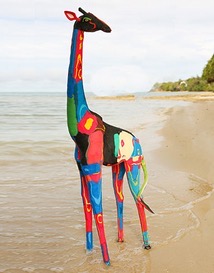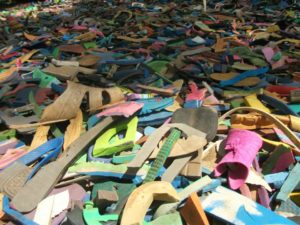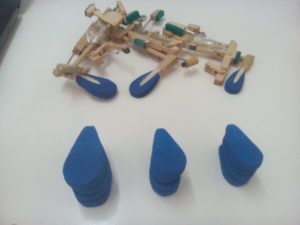Piano Maker’s Corner: Hammers From Recycled Flipflops
 Welcome to another update from Kigali Keys, a project to build pianos in Rwanda.
Welcome to another update from Kigali Keys, a project to build pianos in Rwanda.
We’re still working on forging a decent string frame. We’ve made a couple of attempts which haven’t been quite right. The hitch pins and tuning pin holes require a great deal of precision. We’re now working with Chillington, who usually make heavy agricultural machinery, but have committed themselves to helping us build a working frame.
If we can’t make a frame, we’re in trouble. Importing one would cost a lot in transport and duty, pushing the finished instrument out of most people’s price range.
To release the pressure, we’ve been having some fun.
We’ve teamed up with Ocean Sole in Kenya to produce the world’s first piano hammers made from recycled flipflops.
There are a few things, like tuning pins and strings, which we are definitely going to have to import, but we’re really committed to seeing what we can source locally. If we can make bridle straps and key tops in Rwanda, then we won’t have to worry about international postage and import duty. Good for us, good for the local economy, and good for the sale price of the instrument.
It’s hard, though. There are a lot of things we don’t have in Rwanda. The manufacturing industry is thin on the ground, so sometimes we have to improvise.
Back in 2014, I was visiting a friend in Kenya. She took me for lunch at Marula Studios in Karen, a suburb of the capital, Nairobi.
Marula Studios is home to Ocean Sole, who help to clean the world’s oceans by  gathering up millions of beached flipflops, sorting them into colours and making incredibly beautiful animal sculptures out of them.
gathering up millions of beached flipflops, sorting them into colours and making incredibly beautiful animal sculptures out of them.
We’re a long way off making an action yet, but my mind is always thinking things through. What else could we use? What could we substitute?
My first thought was leather, because old pianos used to have leather hammers. I asked around to see whether anyone had tried a leather-hammered piano before. The verdict seemed to be that they produced a duller sound.
I sat there, rubbing my thumb against the felt, trying to think what else we could  use. That’s when a memory surfaced. I saw myself at Marula Studios, holding one of their sea turtles. It had such a similar weight and texture to hammer felt.
use. That’s when a memory surfaced. I saw myself at Marula Studios, holding one of their sea turtles. It had such a similar weight and texture to hammer felt.
I immediately dropped them a line and their manager, Joe Mwakiremba, responded. We had a chat via Skype. It took a bit of explaining, as mad ideas usually do, but they graciously agreed to take a look.
We sent them one bass, one mid-section and one treble hammer, and asked for five of each in return. They made them using blue flipflops, which look incredibly cool, and they really do feel extremely similar to felt.
It is going to be a couple of months before we can test them. We need to reconstruct Lirika, and she’s in pieces in the workshop. But we’re really excited about it. There’s a strong possibility they won’t work. Maybe they won’t be durable enough or maybe they won’t produce the right sound, but it’s certainly an entertaining experiment. It is tough building a piano with so few resources, but at the same time, it really pushes you to be inventive.

